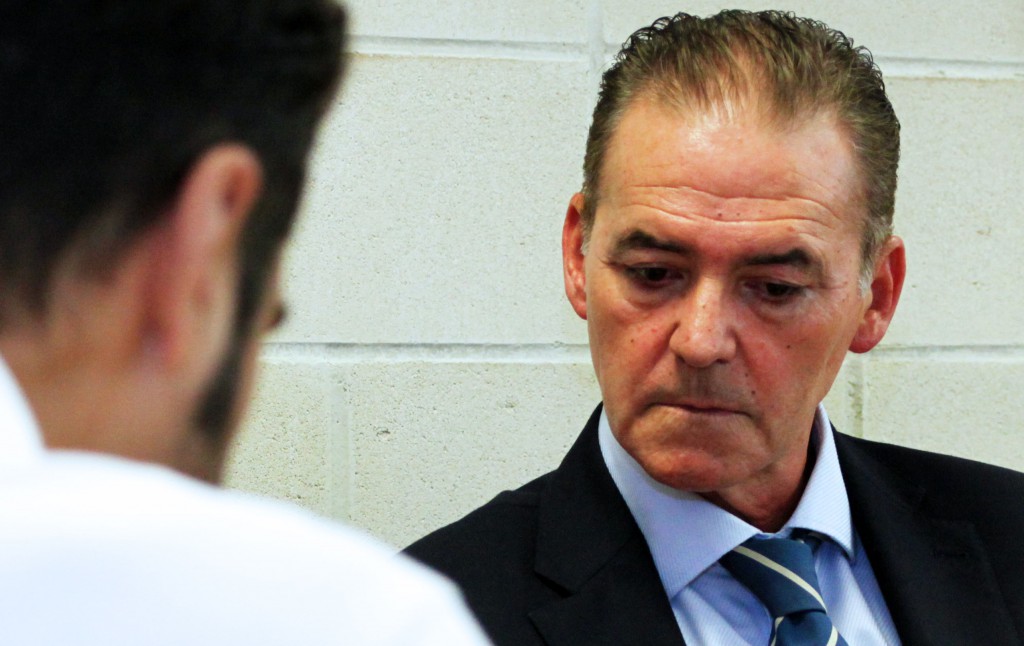Francisco López: “Resulta muy gratificante saber que los graduados en Derecho de la UIB están entre los mejor valorados de todo el país por los empleadores"
Entrevista a Francisco López Simó, Catedrático de Derecho Procesal y Decano de la Facultad de Derecho de la Universitat de les Illes Balears
Desde que en julio de 2014 sucediera a Santiago Cavanillas al frente del decanato de la Facultad de Derecho de la UIB, lleva acumulados dos años de intenso trabajo como máximo responsable de los 1.500 estudiantes y 125 profesores que conforman los estudios de Derecho y Relaciones Laborales en el campus universitario de Palma. Para dicho cometido, la Facultad cuenta con un equipo decanal amplio, formado por el Decano, cinco Vicedecanos y un Secretario.

– El próximo mes de julio se cumplen 2 años desde que se convirtiera en el Decano de la Facultad de Derecho. ¿Qué valoración hace de este período y qué desafíos se plantea la Facultad en los próximos tiempos?
– Hago una valoración de este periodo muy positiva. Ha supuesto para mí entrar de lleno en un mundo desconocido y que resulta apasionante, como es la gestión universitaria: estar al frente de tu Facultad, luchando cada día por ella, por sacar adelante proyectos para mejorarla y lograr que esté entre las más valoradas del país, es un gran reto profesional y, a la vez, un honor y un privilegio.
En líneas generales estoy satisfecho con el trabajo realizado hasta ahora, porque durante estos dos primeros años de dirección de la Facultad primordialmente me ha tocado –nos ha tocado a todo el equipo decanal– afrontar la acreditación por la ANECA (la Agencia Nacional de Evaluación de la Calidad y Acreditación universitaria) de los nuevos planes de estudios adaptados al espacio universitario europeo, los conocidos como “planes Bolonia”. Finalmente, tras un año 2015 de intenso trabajo, muy duro (cientos de informes, reuniones con todos los grupos implicados, visita de los evaluadores…), podemos decir que el proceso de acreditación ha ido muy bien, puesto que ya tenemos unos pre-informes que nos indican que nuestros estudios –el Grado en Derecho, el Grado en Relaciones Laborales y el Máster de Abogacía que impartimos con el Colegio de Abogados de Baleares– cumplen holgadamente los estándares de calidad exigidos por la ANECA. Resulta gratificante comprobar como los evaluadores de la ANECA consideran que la Facultad de Derecho funciona perfectamente, que nuestra oferta académica es buena, de calidad. Y más gratificante, si cabe, es saber que nuestros graduados están entre los mejor valorados de todo el país por los empleadores, según el último ranking Universidad-Empresa de la Fundación Everis. Todos –profesores, personal de administración y servicios y alumnos– tenemos motivos para sentirnos muy orgullosos de esta Facultad.
En cuanto a los retos de la Facultad para los próximos años, tengo “in mente” muchos proyectos: crear una Cátedra de oratoria jurídica que permita formar adecuadamente a nuestros estudiantes en esta importante competencia para cualquier profesional del Derecho; potenciar la internacionalización de la Facultad, a base de impartir más asignaturas en inglés, de incrementar los convenios Erasmus, e incluso poner en marcha un grupo Hispano-Alemán del Grado de Derecho… El objetivo de todos ellos es el mismo: hacer de esta una muy buena Facultad de Derecho, conocida y apreciada dentro y fuera de España; y podemos conseguirlo, tenemos los medios para lograrlo.
– ¿Qué aspectos cree que han experimentado una notable evolución en beneficio de los estudiantes actuales de derecho de esta universidad, en estos 30 años que han transcurrido desde que usted se licenciara en derecho por la UIB?
– En estos 30 años ha cambiado mucho, y en mi opinión a mejor, la orientación de los estudios de Derecho, en la UIB y, en general, en todas las universidades españolas. El plan de estudios que yo cursé (el plan de 1953) era un plan de 5 años, con 25 asignaturas anuales, desarrolladas a base de explicaciones puramente teóricas; teníamos que meternos en la cabeza –“empollar”– extensos manuales, códigos legislativos… era un estudio muy memorístico. Actualmente ya no es así, ahora los estudios de Derecho se completan en cuatro años, durante los cuales hay que cursar 40 asignaturas semestrales, que se desarrollan combinando teoría y práctica en una proporción 65%-35% aproximadamente. Desde el primer curso los estudiantes del Grado tienen en todas las asignaturas horas de clase teóricas y prácticas, lo que permite que adquieran competencias y habilidades que nosotros no adquiríamos en la carrera: redactar un contrato, un informe de parte, una demanda… Yo diría que de este modo salen bien preparados para integrarse en el mundo profesional, en despachos, en empresas… En cambio, les cuesta más afrontar una oposición, y es lógico porque no están acostumbrados a “empollar”. Creo que el planteamiento de las oposiciones (judicatura, notarías…) debería cambiar, adecuarse a la formación con la que salen de las facultades los actuales graduados en Derecho.
[roto lado=»left» texto=»El proceso de acreditación ha ido muy bien, puesto que ya tenemos unos pre-informes que nos indican que nuestros estudios cumplen holgadamente los estándares de calidad exigidos por la ANECA»]
– ¿Cómo cree que es percibida por parte de los alumnos de la Facultad de Derecho su nivel de preparación una vez concluyen sus estudios? ¿Ha detectado nuevas inquietudes profesionales por parte del alumnado en relación, por ejemplo, con el campo de las nuevas tecnologías y el llamado ‘derecho de internet’?
– A lo largo de su carrera, los alumnos cumplimentan toda una serie de encuestas que forman parte indispensable del sistema de garantía de calidad de la UIB. Al terminar cada semestre, los alumnos contestan de forma anónima –y, por tanto, con total libertad– a una encuesta de satisfacción con las asignaturas que han cursado y los profesores que las han impartido. Al finalizar cada curso, también responden a otra encuesta sobre el nivel de satisfacción general con el plan de estudios que están siguiendo y con la organización y funcionamiento de la Facultad. Además, los alumnos que están a punto de completar sus estudios, los de 4º curso, contestan a una encuesta de cerca de 50 preguntas relativas a las competencias que debían adquirir a lo largo del Grado, donde les preguntamos si ya se sienten capaces de, por ejemplo, elaborar una querella criminal o un recurso administrativo. Y, en términos generales, lo que nos transmiten los alumnos en todas estas encuestan es que están bastante satisfechos, puesto que las puntuaciones que otorgan a profesores, plan de estudios, organización de la Facultad y nivel de formación adquirido se mueven en torno al notable alto.
Respecto de las nuevas tecnologías, es evidente que el impacto de las mismas está dando lugar a profundas transformaciones en casi todos los ámbitos, también en el derecho. Internet está planteando muchos problemas jurídicos nuevos: el uso de internet para cometer crímenes (cibercrimen), la cancelación de los datos personales en las páginas de internet (derecho al olvido)… Este es un nuevo campo del derecho que suscita un gran interés en los alumnos, porque son chicos que han nacido y crecido con estas nuevas tecnologías alrededor, forman parte de su vida cotidiana. Conscientes de ello, dentro de nuestro plan de estudios hay asignaturas troncales (civil, penal…) que abordan estos nuevos problemas jurídicos; e incluso tenemos algunas optativas, como “Comercio electrónico e Internet”, con las que tratamos de formar a los estudiantes en estas materias de rabiosa actualidad.
– Usted es catedrático de derecho procesal. ¿Cómo explicaría en que consiste la materia a alguien poco o nada ducho en la temática?
– Muy brevemente, le diría que cuando un conflicto jurídico no puede arreglarse amistosamente, a través de la negociación, no queda más remedio que acudir a los tribunales, a la Jurisdicción, para solucionar ese conflicto por medio de un proceso jurisdiccional. El derecho procesal es la disciplina que se encarga, básicamente, de explicar todo esto: la jurisdicción, el proceso, así como los derechos y deberes de los sujetos que intervienen en él. Y le diría también, desde la visión apasionada de quien se dedica a esto, que considero que es una materia muy importante, imprescindible para cualquier jurista: ¡no se puede ser un buen abogado, procurador, juez, fiscal… sin dominar el derecho procesal! Y creo que los estudiantes, ya desde el primer curso, lo perciben así, como uno de los ejes principales de su formación.
– El Derecho Europeo marca cada vez más la agenda legislativa también en España, como estado miembro de la UE. ¿Cómo valora a día de hoy la coordinación a nivel de coherencia entre la normativa europea y la española y hacia a dónde debe encaminarse?
– El derecho europeo (los tratados, reglamentos, directivas…) es parte integrante del ordenamiento jurídico de los Estados miembros, que son los primeros responsables de aplicarlo correctamente y, si es preciso –caso de las directivas– de transponerlo en el plazo establecido. Lamentablemente, algunos Estados –y el nuestro es uno de ellos– incumplen con cierta frecuencia este compromiso, infringen reiteradamente la legislación comunitaria: la UE nos ha dado muchos “tirones de orejas” por este motivo (céntimo sanitario, doctrina Parot, ayudas a los astilleros y a los clubes de fútbol, tarjeta sanitaria europea…) No debemos seguir por este camino, para ser miembro de un club hay que aceptar y cumplir todas sus normas.
Soy un firme defensor de la UE, de la integración europea, porque Europa no es sólo garantía de economía de mercado, sino también de libertad, de democracia y de seguridad. En estos días en que se habla tanto y con tanta preocupación del “brexit” del Reino Unido, si queremos que el proceso de construcción europea sea irreversible, debemos seguir avanzando, además de en la unión política, económica y social, en la unión jurídica: más Europa, y más derecho europeo.

– ¿Qué tipo de relación tiene, o ha sido, con Bufete Buades?
[roto lado=»right» texto=»Si queremos que el proceso de construcción europea sea irreversible, debemos seguir avanzando, además de en la unión política, económica y social, en la unión jurídica: más Europa, y más derecho europeo»]
– Aunque ya había oído hablar mucho de él, conocí personalmente a D. Joan Buades en un curso de postgrado sobre la nueva LEC que organizamos la Dra. Isabel Tapia y yo, celebrado en Palma en otoño del año 2000 y en el que el Sr. Buades participó como ponente. Enseguida me pareció que su perfil profesional era muy interesante, que podía ser un buen “fichaje” para la Facultad, así que le animé a colaborar regularmente con nosotros en el futuro, a concursar a una plaza de Profesor Asociado en cuanto se presentara una ocasión. Y la ocasión llegó en el curso 2001/2002, siendo yo Vicedecano de ordenación académica, cuando en la Facultad estábamos implantando el llamado Plan de 1997 (un plan de estudios de Licenciatura en Derecho que tuvimos en la UIB entre el viejo plan del 53 y el actual plan Bolonia) y se puso en marcha una importante pieza de ese plan, el “Prácticum” (una asignatura del 2º semestre de 5º curso totalmente práctica y que, por tanto, consideramos que debía estar a cargo de diversos profesionales del mundo jurídico: abogados, jueces, fiscales…), y el Sr. Buades fue uno de los profesionales que se hizo con una de las 9 plazas de Profesor Asociado que sacamos a concurso para impartir esa asignatura. Fue Profesor Asociado del Prácticum (concretamente del Prácticum de Tribunales, impartiendo Práctica Procesal Civil) hasta 2009. Después, ya con el vigente plan de estudios de Grado, ha sido –y lo sigue siendo en la actualidad– Profesor Colaborador del Departamento de Derecho Privado, colaborando en la docencia de la asignatura optativa de 4º curso “Medios alternativos de resolución de conflictos”, materia en la que es un gran especialista. También ha impartido en los últimos años un seminario sobre Arbitraje societario y Mediación concursal a los alumnos de Máster de Abogacía UIB-ICAIB. Así pues, a pesar de sus múltiples ocupaciones, el Sr. Buades lleva ya muchos años colaborando con nosotros en las tareas docentes, cosa que le agradecemos muchísimo, ya que para la Facultad es muy necesario, imprescindible, poder contar grandes profesionales del derecho en su plantilla de profesores: nadie mejor que ellos puede ofrecer a los estudiantes esa visión práctica del derecho que el plan Bolonia quiere potenciar.
En cuanto a su despacho, el Bufete Buades, creo que no descubro nada si digo que es uno de los despachos “locales” más importantes de Baleares, por el volumen de asuntos que lleva y por número de abogados que lo integran (algunos de ellos, dicho sea de paso, fueron alumnos, buenos alumnos de esta Facultad). Además, varios abogados del bufete han seguido la estela del Sr. Buades y se han implicado también en la docencia universitaria, se han incorporado a esta Facultad como Profesores Asociados: Carlos de la Mata, Lorenzo Salvà, Miguel Reus…
En definitiva, la relación que tengo –que esta Facultad tiene– con el Bufete Buades es una relación larga en el tiempo y muy fructífera en el terreno académico: por lo que acabo de explicar, este bufete es –si se me permite la expresión– una buena “cantera” de Profesores Asociados de la UIB. Y espero que siga siendo así.
– No son pocos los procesos penales de gran envergadura que se están juzgando en los últimos años en los tribunales de Baleares. Desde su experiencia como magistrado, y sólo desde el punto de vista técnico, ¿qué opinión le merece el desarrollo del juicio por el Caso Nóos, uno de los más mediáticos, sino el que más, de la historia reciente de España?
– Sobre la instrucción y el juicio por el caso Nóos podríamos estar hablando horas, días… Es un tema que da para hacer varias tesis doctorales en Derecho penal y procesal: la imputación y desimputación de la Infanta Cristina durante la instrucción; la pretensión de la defensa de Iñaki Urdangarín y de la Fiscalía Anticorrupción de que la investigación dejara de estar en manos del Juez Castro y pasara al Tribunal Superior de Justicia de Valencia; el intento del Fiscal de imputar a la Abogado de Manos Limpias, única acusación que ve indicios delictivos contra la Infanta; el “fuego procesal” cruzado entre el Juez Instructor y el Fiscal… Todo esto, y mucho más, a lo largo de nada menos que 5 años y medio de instrucción y 6 meses de juicio oral, con 6 acusaciones personadas, 18 acusados, más de 300 testigos… Habrán transcurrido más de 6 años entre la iniciación de este macro-proceso y la sentencia; y no acabará aquí la cosa, porque seguramente esta sentencia será recurrida en casación por alguna de las partes; en definitiva, la respuesta judicial llegará, sí, pero tarde, muy tarde. Yo creo que la justicia lenta es justicia, pero es menos justicia.
No hay tiempo aquí para comentar éstos y otros muchos aspectos interesantes de este caso; pero hay algo que considero que debe destacarse: el juicio por el caso Nóos ha servido para demostrar –en contra de lo que muchos afirman– que la justicia es igual para todos. Cristina de Borbón, hermana del Rey e Infanta de España, se ha sentado finalmente en el banquillo de los acusados, no ha sido exonerada de esa “pena” por la Audiencia Provincial de Baleares en aplicación de la denominada doctrina Botín. Habrá que ver qué dice el tribunal en su sentencia, si la Infanta es o no condenada por cooperar en dos delitos fiscales de su marido. En cualquier caso, me parece que hay que señalar la gran profesionalidad, la independencia e imparcialidad que han acreditado durante todo el juicio oral las Magistradas Samantha Romero, Eleonor Moyá y Rocío Martín (por cierto, la primera ex-alumna y la segunda ex-profesora Asociada de esta Facultad); es una de las consecuencias positivas que nos deja el caso Nóos: en esta ocasión, la justicia ha funcionado correctamente.
– Se habla y mucho durante estas semanas de la nueva Ley de Enjuiciamiento Criminal y los problemas derivados que denuncian los fiscales para evitar el archivo de multitud de causas abiertas. ¿Cómo valora esta ley que entró en vigor el 6 de junio?
– La reforma procesal penal de 2015, que es la enésima “reforma-parche” de nuestra vetusta Ley de Enjuiciamiento Criminal de 1882, merece, a mi juicio, una valoración global positiva. Esta reforma introduce en la Justicia penal nuevas e importantes medidas de agilización, de investigación (regulación de las medidas de investigación tecnológica, necesaria y urgente ya que la LECRIM únicamente contemplaba hasta ahora la interceptación de las comunicaciones postales, telegráficas y telefónicas) y de fortalecimiento de garantías procesales (sustitución del término “imputado” por “investigado”, generalización de la segunda instancia penal, establecimiento de un mecanismo de revisión de las sentencias del Tribunal Europeo de Derechos Humanos, reforzamiento del derecho de defensa en todos los estadios del proceso penal…).
De entre las nuevas medidas introducidas por la reforma de 2015 para agilizar la Justicia penal y evitar dilaciones innecesarias de los procesos (modificación de las reglas de conexión delictiva con la finalidad de evitar el incremento de las llamadas “macrocausas”, no remisión a los juzgados y al Ministerio Fiscal de los atestados policiales relativos a delitos sin autor conocido, la regulación de un nuevo proceso por aceptación de decreto del fiscal o monitorio penal a fin de ofrecer una respuesta punitiva muy rápida a los delitos de escasa gravedad…), sin duda la medida “estrella” y la que más repercusión mediática ha tenido ha sido la fijación de plazos máximos para la instrucción: la fase de investigación del proceso penal se limita temporalmente a seis meses para las causas sencillas y a dieciocho para las complejas, unos plazos que el legislador de la reforma de 2015 califica de “realistas” y “fiables”.
Las asociaciones de fiscales han alertado sobre el riesgo de impunidad que comporta el transcurso de los referidos plazos máximos. No obstante, ese riesgo me parece a mí que es realmente bajo: la reforma de 2015 ha establecido un listado de supuestos bastante amplio en los que se considerará que la investigación es “compleja”, por lo que no será infrecuente en la práctica que una instrucción que entrañe cierta dificultad y precise de más tiempo para concluir sea declarada compleja y pueda así durar hasta un máximo de 18 meses, prorrogable, además, una primera vez por igual o inferior plazo, a solicitud del fiscal, y excepcionalmente prorrogable otras veces, no sólo a instancia del fiscal sino también del resto de partes personadas, cuando concurran causas que lo justifiquen. Más aún: todos los plazos anteriores quedan interrumpidos mientras que las actuaciones se hallen bajo secreto o cuando se acuerde el sobreseimiento provisional de la causa (nueva redacción del art. 324 LECRIM). Por lo tanto, no se trata en realidad de un horizonte infranqueable y relativamente corto en el tiempo, sino de un horizonte flexible y que puede rebasar incluso los 36 meses, 3 años de duración.
– Cuando no amplía conocimientos sobre leyes, ¿qué otro tipo de lecturas suelen ocupar su tiempo?
– Me gusta mucho la novela histórica (Robert Graves, Pérez Galdos, Hugh Thomas, Santiago Posteguillo, Ken Follett…), en particular la ambientada en el Egipto faraónico (Christian Jacq y Terenci Moix); y también, seguramente por deformación profesional, la novela de temática jurídica, de ficción legal (John Grisham, Scott Turow, Robert Traver, Harper Lee, Borja Martínez-Echevarría…).
Pero últimamente la lectura ya no es lo que más me entretiene en mi tiempo libre; supongo que es una reacción inconsciente frente a mi trabajo, que me obliga a leer muchísimas horas al día. Durante los fines de semana y las vacaciones lo que más me divierte es hacer deporte, sobre todo tenis y pádel. Soy un fan del tenis, me apasiona desde que era un niño y aprovecho las vacaciones de verano para retomarlo, para entrenar y apuntarme a algún torneo de veteranos: me encanta la adrenalina de la competición. Por supuesto, soy un gran admirador de nuestro Rafa Nadal, le sigo por televisión y en vivo siempre que puedo; sería fantástico verle morder su décima Copa de los Mosqueteros en París.
También me encanta viajar, hacer de vez en cuando una escapada con mi mujer o con ella y nuestros hijos o con amigos; para mí, sin duda es la mejor forma de romper con la rutina, de “desconectar” por completo. Mallorca es un lugar maravilloso para vivir, pero el mundo es demasiado bonito como para quedarse en casa y no salir a verlo.




































